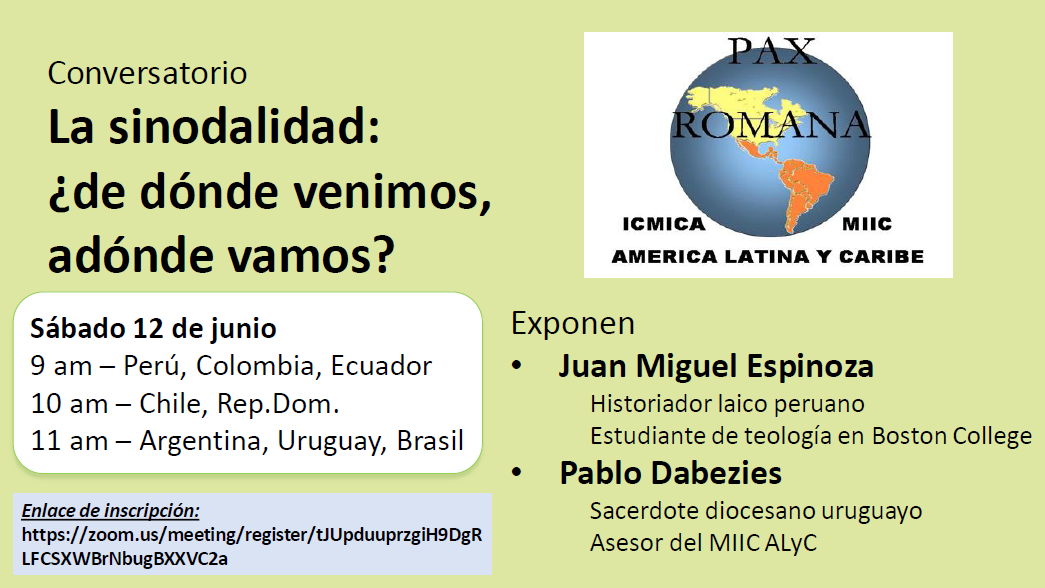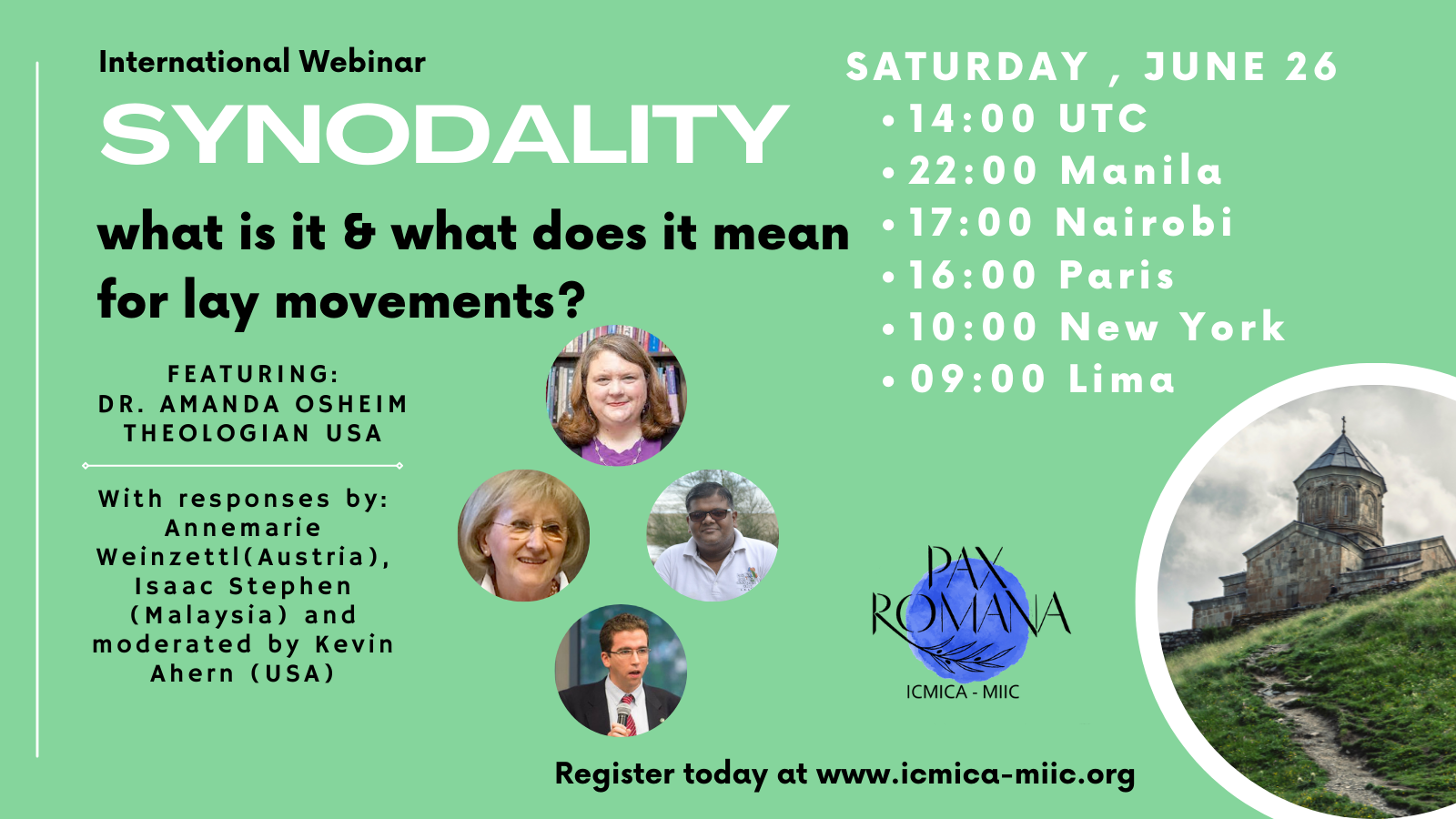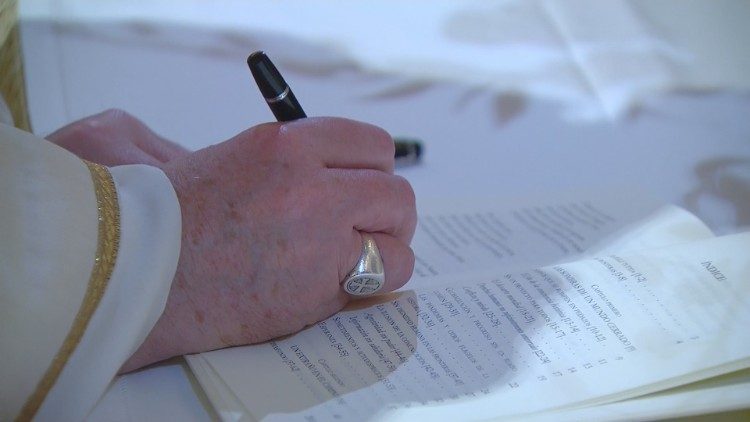 Old wine in old wineskins
Old wine in old wineskins
1- “We are not living in an era of change but experiencing the change of an era”, thus Pope Francis to the Italian bishops. A deep reaching change is taking place. This we have to master. For this, small reforms are not enough. Courage is required. He, the Pope, has this. Within five years he has changed the Roman Catholic Church. Structures are being renewed. A decentralisation is under way. The Pope is convinced that the Holy Spirit is not at work onlv in Rome. In his inaugural speech “Evangelii Gaudium” he quoted regional bishop-conferences 40 times. When the four “dubia cardinals” waited for an answer to their letter about “Amoris Laetitia”, he adapted a pastoral letter of the Argentine bishops and raised this to the rank of a genuine teaching. He gave this local letter the authority of a “magisterium authenticum”.
In 2019, the Amazon synod most likely will decide or the ordination of married catechists. The Pope will be present. Many suspect that he will say to the bishops of Amazonia: If you have prayed and fasted enough and you consider this decision to be right and necessary, then make it. In consequence, this will also encourage other conferences of bishops. The old saying “Roma locuta, causa finita” does not count any more. In future not everything will come from the head office in Rome. Rome rather, will learn from regional churches. So the worldwide Roman Catholic Church learns synodality and subsidiarity. In this development, the responsibility of the Pope is not relinquished. But it will be cultivated in a different way. So church structures develop in an epochal way. This is one dimension of the coming new era.
But it is not only the structures that are developing. The pastoral culture is in change too. The emphases are moving within this pastoral culture. The accent is transferring from sin to wound, from moralising to healing. The church does not lead people into the courtroom any more but into a “field hospital”. The accent is relocated from law to face. The general law is not any applied to everyone indiscriminately anymore. The individual case counts whom the law should serve. And when the law harms in an individual case, mercy as completion of the law and of God’s justice takes effect. Whoever imposes the law without mercy easily becomes an ideologue. According to Antonio Spadaro in an interview with Andreas Batlogg about the Pope, he is not an ideologue but a shepherd.
This Pope does not only theoretically talk about a change of the era. He also promotes this. In this way, he is also continuing the reforms of the Second Vatican Council. From here, the growing resistance to the Pope becomes easily comprehensible. This is not so much resistance to the person of the charming Pope but against the way in which the Pope determinedly leads the Church.
2- We look back briefly into the past era. We call this the Constantine era. Due to the close merging of Church and State, Europe was totally christianised. In the post-reformation age, the connection between Church and State was strengthened for political reasons. At this time, Christianity was an inescapable fate for the people. Who, for example, in Austria did not want to be Roman Catholic was “expelled to the beyond” or later sent abroad.
3- However, this era was not only a success story. It is also a story of blood and tears which has left deep traces in the European culture. The bloody religious war (1618-1648) which lasted for thirty years, damaged the reputation of the Christian denominations in Europe badly. “Christianity waged war against Christianity” – as today “Islam wages war against Islam”, as the German Islamic writer Navid Kermani has formulated. God and violence were connected closely. This did not put God in credit but in discredit. A first consequence was a “dechurching” (I mean moving away from churches) of broad parts of the. Voltaire wanted a world religion without denominations, without churches. Peace is only possible when religion is deprived of weapons and when one takes away religion from the powerful. However, the development continued. In France, a European atheism arose. This wanted not only to protect people from the Churches but also from a God, whose name the powerful ones had usurped to legitimise wars.
4- This Constantine era in its post-reformation shape is now definitely over. According to the great sociologist of religion Peter L. Berger, Christianity for most people in Europe today is no longer “fate, but choice”. For this choice cultural traditions do not suffice, but need attractive benefits (some expert call them gratifications): “Why is the Gospel a blessing for our life and our living together?” Why is it good not only for the individual person but also for the society? And this in the Europe of today! The churches have relied on tradition for too long and forgot the aggiornamento (the updating). Cardinal Carlo M. Martini said shortly before his death: “The Roman Catholic church is 300 years behind the times.” To say it with the image from a sermon of Jesus: “The wine has become old.” The wineskins are also old and brittle: the pre-modern hierarchical structures, the clericalism, the stereotypical roles of man and woman, the fear of human rights, of women’s fight for justice which is fought within the Church shortsightedly as gender ideology. Not least the attitude to the various forms of sexuality and love between the different sexes, is pre-modern.
5-Therefore, today the Roman Catholic Church in Europe is in a dramatic transition period. In such times, the temptation is great to simply adapt the conventional church business to the reduction in numbers of church members, priests, members of religious congregations and finances. “Downsizing”, which means reducing the traditional church business, is stated on the agenda. It is a paradox: The smaller the church business is, the larger are the pastoral areas. Bishop Reinhold Stecher from Tyrol once said: The Church complains that people are leaving the Church. However, the truth is that the Church is leaving the people.
The reforms which are taking place today do not reach far enough. They remain joined to the old era. Many dioceses reform their structures within the existing frame, but they do not reform the frame itself. This has been having fatal effects on the work of the Church in Europe. The structural reforms bind all energy within the Church. A kind of church implosion happens. The Church loses sight of the destiny of the world and its people. “A Church which is busy with itself becomes sick”, Pope Francis diagnoses.
Young wine in new wineskins
Do we, therefore, have in Europe’s churches old wine in old wineskins? Some responsible people will reply: We have anyway been fulfilling a new evangelisation of Europa for many years. We call for missionary effort. We create new wineskins with enormous exertion and set up new pastoral structures. Though, all these structural measures do not hold back the decline of the old era. Still less, they are not leading us courageously to the new era. We mend the old wineskins, but we lack the young wine. Let me therefore meditate a little about the young wine.
6- Pope Francis reminds us to have the Bible constantly at hand. This teaches us that everything has its beginning with God. God has demonstrated in his incarnation that he is concerned with humankind and the world. Through his death on the cross and in his resurrection he entered into the heart of the world. There, we do not now find death and futility anymore, but God and life. So said Pope Francis, according to an Easter sermon by Karl Rahner. God became a human being so that the world – united with God – becomes more human.
However, in incarnation God practised “Kenosis” (self-emptying). God left himself and became one of us. He expects the same from us, his people: That we abandon ourselves, open ourselves up and dive into the world of today, into the joys and sufferings of the people. Therefore, the first question for a church on the way to a new future is: What is the situation of the world, of the people? What are – according to the pastoral constitution of the Council — “the joys and the hopes, the griefs and the anxieties of the men of this age, especially those who are poor or in anyway afflicted?
7- Along with Popes John XXIII and Francis, I do not count myself as one of the “calamity howlers” – Cassandras, who see only darkness in the world: secularisation, “dechurching” (leaving the churches), relativism. This modern world attains great benefits. The performances of the economy, science and medicine are enormous. Today, fewer children are starving, the rate of illiteracy is dropping, respect for human rights is expanding, more and more peoples are demanding liberty and justice between genders is growing. The strength of civil society is increasing. Many commit themselves to those in need. A selfless solidarity is found not only by Christians but by many people of good will.
8-There is also a dark side, though. The ecosystem is threatened with collapse. The present financial world and the economic system is highly unstable. The distribution of goods in the world is increasingly unjust. Social conflicts and local wars are the consequence. “This economy kills”, according to Pope Francis. The “cry of the poor” in the One World sounds more loudly. Corruption aggravates the situation in many poor regions of the earth. In addition, there is the cultural humiliation of the Arabic world by the Western world and its hegemony. Terrorism is a result of this humiliation.
9- So light and darkness are side by side in today’s world. This also applies to those emotions which form geopolitics. “Chindia” (China and India together) is a region of the hope, according to French political scientist Dominique Moisi. The Arabic region feels humiliated by the Western world. However, today in the wealthy regions of the world – North America and Europa – the prevailing mood is fear.
Fear has been a part of the human life from the very beginning. The depth psychologist Monika Renz has dealt with the arising of fear in the maternal womb. There, consciousness awakes and with it primordial fear (in German “Urangst”, because we are lost in the vastness of the world into which we are born. And at the same time, we feel another dimension of this primordial fear: that we possess too little to survive.
In Europe today, this primordial fear is given cultural nourishment. We live in a “culture of fear” (Frank Furedi), in a “society of fear” (Heinz Bude). Cultures which are marked by fear tend to delimitation. Many anxiously demand, Europe should wall up its borders. Europe should become a fortress. In respect of the many refugees seeking protection, who came to Europe in 2015, many felt that all this is too much for us, that we cannot cope with it. At the same time, the fear grew, that it does not suffice for us any more, if so many people arrive and lay a claim to our welfare state.
Fear takes the power for solidarity away from us. International solidarity is replaced by nationalism. In 1991, experts of the Club of Rome forecast a growth of a “defensive racism”. All over the world, in free elections rightwing populistic parties come to power. The liberal democracies mutate increasingly into illiberal ones. The two great values of Europe are in danger: liberty and solidarity and – in the end- -, with them truth and so the respect for the dignity of all and for human rights.
Therefore, fear has fatal consequences in the life of the individuals and in politics. Fear hinders the individual of becoming a loving person and with that a true human being. In politics, fear destroys solidarity. Without solidarity, however, there is no justice.
And without justice no peace. I understand the 32nd president of the United States of America, Franklin D. Roosevelt, who said in his inaugural speech in the midst of the Great Depression of 1933: “The only thing we have to fear is fear itself.”
10- This is, therefore, the dilemma of our Church. She experiences the greatness but also the threat of Europe tangibly through its own members. However, just at this time of great challenges it is occupied with shortage of priests, celibacy, abuse of children, clericalism, structural change and the rescue of the traditional church business.
11- At a time like this, the Church could be a blessing for the world, if it takes its power from the Gospel. It could contribute to healing the soul of Europe, which today is being “eaten up” by fear. Instead of a culture of fear, a culture of confidence could be encouraged to grow within the church communities and spread outward from those communities in to the world.
A part of such a culture of confidence is religious knowledge about the unity of creation and the “one world house”. If there is only one God, then each of us is one of us. If the five-year old Aylan Kurdi drowns in the Aegean See, one of us drowns. If one member suffers – not only within a community but within humankind – all of us suffer. Since the atomic catastrophe in Fukushima, this statement is no longer only religious but very real.
From the unity in being, this “chain of being”, a universal solidarity arises. This knows no upper limits. Unity in being and in solidarity are not comfortable truths but enormous challenges.
Are we Christians convinced that God gives us the strength to meet these challenges? Could we not, in our Churches, develop an “alternative culture of confidence” in the midst of a “Europe of fear”? Through this, could fear decrease and – with confidence – justice in Europe greater? However, increasing justice is the strongest instrument of a lasting security policy. This could make our Churches, accord with the sermon on the mount, the light of the world and the salt of the earth (cf. Mt 5:13f). Jesus gave this mission to his disciples on the mountain of the Beatitudes.
12- But how can we as Christians learn to live in the midst of our fears? If we look to Jesus we find the answer. He suffered from extreme fear, not least at the end of his life. As a human being he did not evade the fear of death. He stood firm in the face of fear because he always felt connected: Connected to his God whom he lovingly called abba, father. These is the best advice for how we as Christians can learn confidence. Whoever has confidence can believe, hope and love. But whoever stays within the prison of fear, must defend themselves against it: We do this privately through violence, greed and lies. The political strategies against fear are terrorism, financial greed and corruption.
Richard Rohr, the Franciscan mystic from New Mexico, shows us a good way to confidence, teaching: It is not necessary to be perfect, but to be connected. As important as it is for the Church in Europe to be present in the society, it is just as important that we ourselves are “connected”. According to the great spiritual teachers such as Roger Schutz, Dorothee Solle and Johann B. Metz, politics arises from mysticism. Whoever immerses themselves in God will finds themselves next to the poor on the edges of life and society.
Jesus therefore went onto the mountain at night to experience intimacy with his God. Then in the morning, he comes down from the mountain, meets a leper on the edge of life and loves him back into life. (See Mt 8:1-4)
I understand more and more what Karl Rahner wrote: “The Christian of the future will be a mystic, therefore one who experienced something, or he will not be.” This mysticism is politically dangerous. “Whoever goes down on their knee before of God, never does again before the party.” Pope John Paul II is supposed to have preached this in 1979 in the midst of martial law in Poland on Victory Square here in Warsaw.
Young wine: that is “to be connected”, and filled with God, passionately care for the poor. This is the church vision of Francis. But where does this “to be connected” occur today?
The spiritual masters teach that there are many ways. The best one is the celebration of the Eucharist. We eat the “body of Christ” and become through this the “body of Christ”. About this, however, we say that it is a “body given up for the life of the world”. It is a scandal that this celebration – according to John B. Metz a dangerous memory – is, in many regions of the Roman Catholic World Church, sacrificed for the lifestyle of priests.
God became a human being, so that the world would become more human. God expects the same commitment from us, his people. We Christians are a part of humankind. When the life in our communities becomes increasingly human, then a part of humankind has already become more human. And furthermore, if we Christians commit ourselves to the world, as politicians, in the media, in science, in education, in the world of marriage and family, then we can contribute to the growth of humanity. We do not need to be worried about God. He covers our backs. “Just if it gets difficult” – thus said an unpretentious woman committed to refugees – “then I feel a divine tailwind”.
That is what our Church in Europe needs urgently





Leave A Comment
You must be logged in to post a comment.